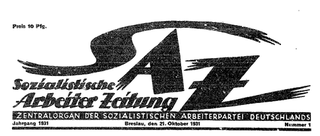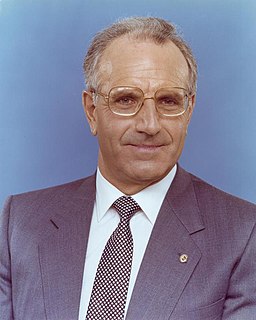Related Research Articles
The Kreuzzeitung was a national daily newspaper published between 1848 and 1939 in the Kingdom of Prussia and then during the German Empire, the Weimar Republic and into the first part of the Third Reich. The paper was a voice of the conservative upper class, although it was never associated with any political party and never had more than 10,000 subscribers. Its target readership was the nobility, military officers, high-ranking officials, industrialists and diplomats. Because its readers were among the elite, the Kreuzzeitung was often quoted and at times very influential. It had connections to officials in the highest levels of government and business and was especially known for its foreign reporting. Most of its content consisted of carefully researched foreign and domestic news reported without commentary.
Neues Deutschland is a left-wing German daily newspaper, headquartered in Berlin.
Regat Germans or Old Kingdom Germans are an ethnic German group of the eastern and southern parts of Romania. The Regat is land that was part of Romania before the First World War. This territory includes Western Moldavia, Northern Dobruja, Muntenia, Oltenia and the Hertsa region. The Regat Germans, like all other German groups in Romania, are represented in politics by the Democratic Forum of Germans in Romania (FDGR/DFDR).

Focus is a German-language news magazine published by Hubert Burda Media. Established in 1993 as an alternative to the Der Spiegel weekly news magazine, since 2015 the editorial staff has been headquartered in Germany's capital of Berlin. Alongside Spiegel and Stern, Focus is one of the three most widely circulated German weeklies. The concept originated from Hubert Burda and Helmut Markwort, who went from being Editor-in-chief to become publisher in 2009 and since 2017 has been listed in the publication's masthead as Founding Editor-in-chief. The current Editor-in-chief of Focus as of March 2016 is Robert Schneider.
Willi Eichler was a German journalist and politician with the Social Democratic Party of Germany (SPD).
The Allgemeine Deutsche Zeitung für Rumänien (ADZ) is a German-language daily newspaper based in Romania.
Volkswille, later renamed Arbeiter-Zeitung, was a German language newspaper published from Temesvár/Timișoara between 1893 and 1933. Volkswille was the main organ of the German-speaking labour movement in the Banat region. It was the sole long-lasting German-language socialist newspaper in the region.
Schlesische Arbeiter-Zeitung was a left-wing German language newspaper published from Breslau, Province of Lower Silesia, Weimar Germany between 1919 and 1933.

Sozialistische Arbeiter-Zeitung was a daily newspaper published in Germany between 1931 and 1933. SAZ was the central organ of the Socialist Workers Party of Germany (SAPD).

Deutsche Volkszeitung was a newspaper published daily from Berlin, Germany between 1945–1946. It was the organ of the Central Committee of the Communist Party of Germany (KPD).
Anton Breitenhofer was a Swabian journalist, writer and politician in Romania. Breitenhofer spent his youth working as a locksmith in Reșița during twenty-two years. He became a member of the Communist Party of Romania during the initial phase of the Second World War. After the war he spent time in the Soviet Union, deported for forced labour. He served as editor-in-chief of Neuer Weg between 1954 and 1976. He served as secretary of the German Anti-Fascist Committee 1949-1952.
Ernst Breitenstein was an ethnic German journalist and politician in Romania. He had Saxon-Jewish origins. Breitenstein joined the Communist Party of Romania in 1939. Between 1944-1949 he edited the Sibiu pro-communist publication România viitoare under the pen name Cornel Petraru.
The Anti-Fascist Committee of German Workers in Romania, originally the German Anti-Fascist Committee, was an anti-fascist organization for ethnic Germans in Romania. Emmerich Stoffel was the chairman of the Committee and Philipp Geltz its secretary. The Committee was based in Bucharest and published the newspaper Neuer Weg.
Prague German was the dialect of German spoken in Prague in what is now the Czech Republic. The written form of this dialect from the Luxembourg rule played an important role in the history of the German language for its balancing function between the written upper Austrian and southern German dialects and eastern Central dialects of central Germany, which later developed the spelling of Modern German writing.

Werner Jarowinsky was an East German economist who became a party official. Between 1963 and 1989 he was a member of the powerful Party Central Committee which, under the Leninist constitutional structure that the country had adopted after 1949, was the focus of political power and decision making. Within the Central Committee, from 1984 till 1989, he served as a member of Politburo which controlled and coordinated the work of the Central Committee on behalf of the leadership.

Sozialistische Monatshefte was a German journal edited by Joseph Bloch from 1897 to 1933 and published by the Verlag der Sozialistischen Monatshefte in Berlin.
Hedwig Forstreuter, was a German journalist and writer.
Edgar Hartwig is an East German historian. In the GDR he taught scientific socialism at the Hochschule für Musik Franz Liszt, Weimar until 1989 and, within the framework of the "Arbeitsgruppe zur Geschichte der bürgerlichen Parteien" at the Friedrich-Schiller-Universität Jena, he presented the history of the Pan-German League and the German Agrarian League.
Mitteldeutsche Neueste Nachrichten was a German language regional daily newspaper which was based in Leipzig, East Germany. The paper existed between July 1952 and 26 February 1990. Its subtitle was Tageszeitung für Sachsen und Sachsen-Anhalt, and the publisher was Verlag der Nation. Later it was published by a company with the same name. It was an organ of the National-Demokratische Partei Deutschlands. The paper had editions for Halle and Magdeburg.

The "Börsenblatt - Wochenmagazin für den Deutschen Buchhandel", until 2002 "Börsenblatt für den Deutschen Buchhandel", is the association organ of the Börsenverein des Deutschen Buchhandels. The publication, founded in 1834, is the magazine with the highest number of advertisements and circulation in the German book selling trade. It came out once a week, later twice a week, and even daily for many years. The Börsenblatt is published by the Marketing- und Verlagsservice des Buchhandels. It informs the professional audience as well as private readers about news on the book market. Since January 2013, the specialist magazine has been published in weekly alternation as the "Börsenblatt Magazin" and the "Börsenblatt Spezial". The Börsenblatt Spezial highlights the trends within the various product groups. Current industry reports are published on the magazine's homepage.
References
- 1 2 3 4 Newspaper Press Directory. Benn. 1974. p. 853.
- ↑ K. G. Saur Verlag GmbH & Company; Walter De Gruyter Incorporated (1 January 2000). Bauer-Ose - Björnson. Walter de Gruyter. p. 509. ISBN 978-3-11-096114-0.
- 1 2 3 4 5 Elemér Illyés (1982). National minorities in Romania: change in Transylvania. East European monographs. p. 300.
- 1 2 3 Monica Barcan; Adalbert Millitz (1978). The German Nationality in Romania. Meridiane. pp. 87–88.
- ↑ Horia C. Matei (1989). Romania Yearbook. Editura Științifică și Enciclopedică. p. 70. ISBN 9789732900987.
- 1 2 3 4 5 Annett Müller; Arbeitskreis für Siebenbürgische Landeskunde (2002). Abschied in Raten: vom Neuen Weg zur Allgemeinen Deutschen Zeitung für Rumänien : der Wandel der Zeitung nach der massenhaften Auswanderung der Deutschen aus Romänien. Hora. pp. 74–75. ISBN 978-3-929848-23-6.
- 1 2 Zeitschrift für Siebenbürgische Landeskunde. Vol. 13–14. Böhlau Verlag. 1990. p. 152.
- ↑ Directory of Romanian Officials. Central Intelligence Agency. 1973. p. 179.
- 1 2 Directory of Officials of the Socialist Republic of Romania. Central Intelligence Agency. 1982. p. 136.
- ↑ Günter Holtus (1 January 1989). Die einzelnen romanischen Sprachen und Sprachgebiete von der Renaissance bis zur Gegenwart: Rumänisch, Dalmatisch / Istroromanisch, Friaulisch, Ladinisch, Bündnerromanisch. Walter de Gruyter. p. 236. ISBN 978-3-11-096611-4.
- ↑ Annemarie Weber (2010). Rumäniendeutsche?: Diskurse zur Gruppenidentität einer Minderheit (1944-1971). Böhlau Verlag Köln Weimar. pp. 88–89. ISBN 978-3-412-20538-6.